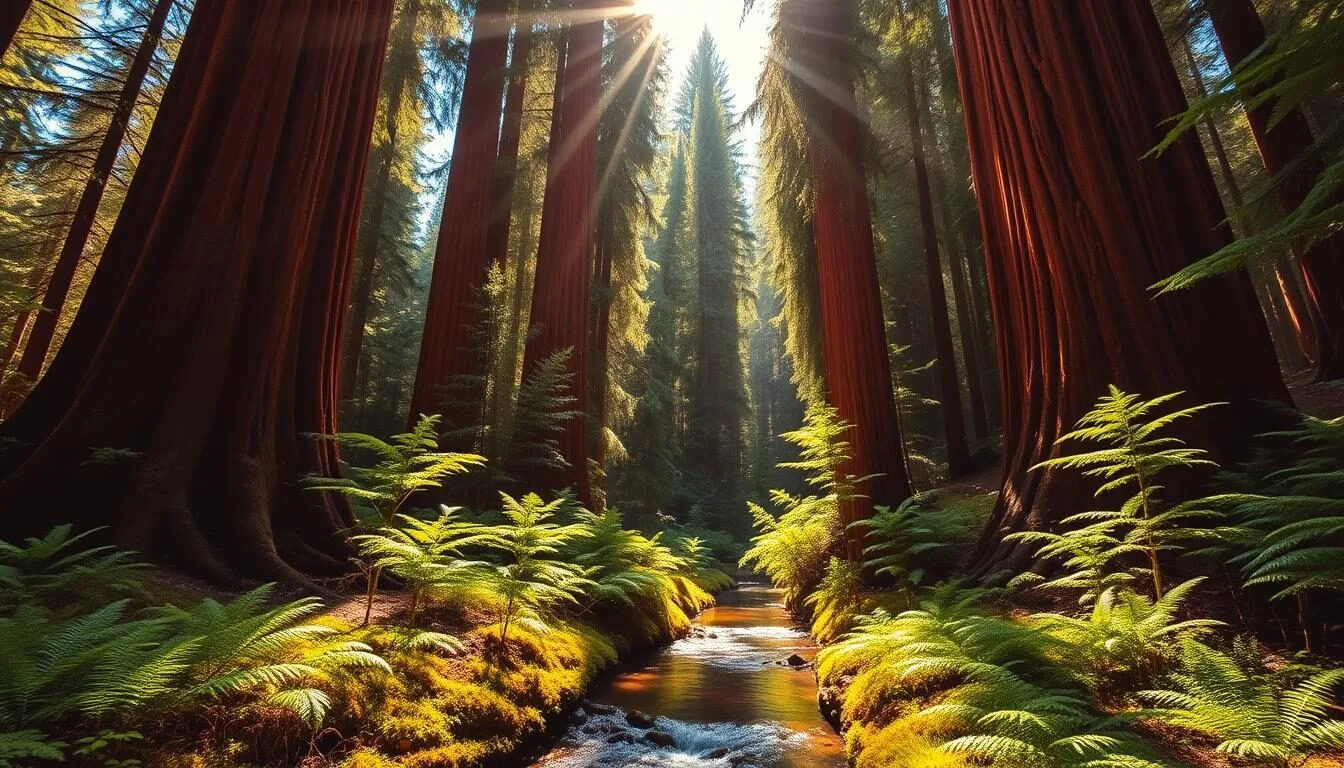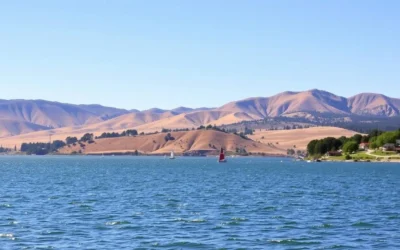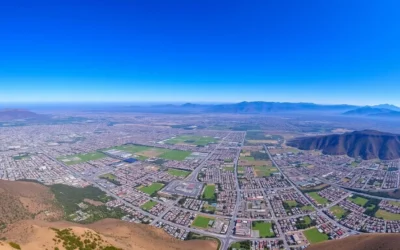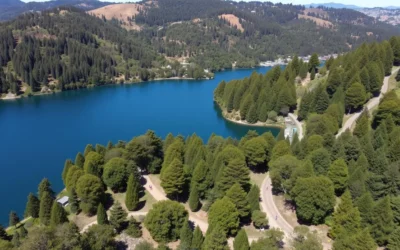✓ Accommodations ✓ Flights ✓ Rental Cars ✓ Tours & Activities
Nestled in Northern California, near the Oregon border, lies a natural wonder that will leave you in awe. Redwood National Park, along with its neighboring state parks, is home to some of the tallest trees on Earth.
This collective park system offers a diverse range of experiences, from exploring ancient redwood forests to taking in the stunning coastal views. Whether you’re traveling with family or are an avid hiker, there’s something for everyone.
Our guide will help you plan your trip, providing insider tips on when to visit, what to see, and how to make the most of your time in this breathtaking park system.
Understanding Redwood National and State Parks
The Redwood National and State Parks system is a collaborative effort between federal and state agencies to protect some of California’s most stunning natural landscapes. This unique partnership allows for a cohesive management approach, ensuring that the parks are preserved for future generations.
The Unique Park System
The Redwood National and State Parks comprise four distinct units: Redwood National Park, Jedediah Smith Redwoods State Park, Del Norte Coast Redwoods State Park, and Prairie Creek Redwoods State Park. The state parks were initially established in the 1920s and 1930s to safeguard old-growth forests, preceding the creation of the national park in 1968. This cooperative management system means that there’s no distinction between the national and state parks in terms of access or amenities, making it a seamless experience for visitors.
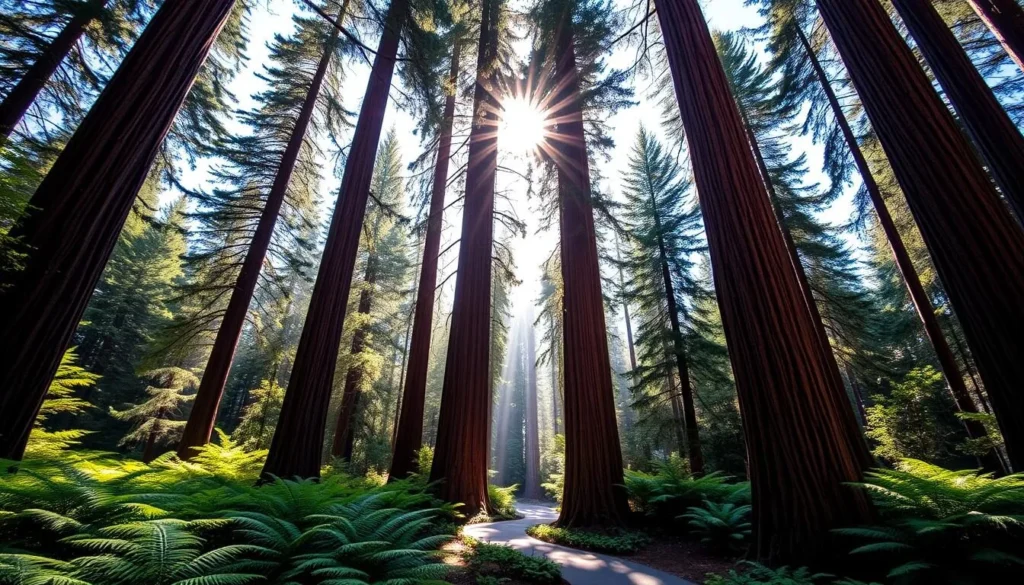
Map and Layout of the Parks
The Redwood National and State Parks span over 130,000 acres along California’s northern coastline, creating a vast and diverse area of natural beauty. Understanding the layout is crucial for planning your visit, as attractions are spread across multiple locations. The parks are managed as a single entity, meaning there’s no entrance fee to visit either the national or state parks within the complex. This integrated approach enhances the overall visitor experience, allowing you to explore the redwoods without the hassle of separate park fees.
By recognizing the interconnected nature of the Redwood National and State Parks, you can better appreciate the national state parks system’s value in preserving these incredible natural resources. The combined efforts of federal and state agencies have created a truly unique state park experience that is accessible to everyone.
Best Time to Visit Redwood National Park
To make the most of your visit to Redwood National Park, understanding the seasonal dynamics is crucial. The park is open year-round, but the experience varies significantly with the seasons.
Seasonal Considerations
Each season offers a unique experience at Redwood National Park. Spring (April-June) is particularly appealing as the forest is lush and green, with fewer crowds than the peak summer months. While early spring might see some seasonal footbridges not in place, it’s still a great time to visit. In contrast, summer (June-August) offers the most reliable weather but comes with larger crowds and higher accommodation prices. Fall (September-November) brings beautiful colors and mild temperatures, with visitor numbers moderating after the summer rush. Even winter (December-March), despite being rainy, offers a magical misty atmosphere and is the least crowded period.
Weather and Crowd Factors
Weather plays a significant role in the Redwood National Park experience. Rain and fog, common year-round, actually enhance the redwood forest experience by creating a mystical atmosphere. For photographers, overcast days are ideal as they diffuse harsh shadows, making it perfect for capturing the majestic trees. It’s essential to check for seasonal trail closures or footbridge removals that might affect accessibility to certain areas. Planning around these factors can significantly enhance your visit.
| Season | Weather | Crowds | Experience |
|---|---|---|---|
| Spring (April-June) | Mild, occasional rain | Fewer than summer | Lush, green forest |
| Summer (June-August) | Reliable, warm | Large crowds | Peak tourist season |
| Fall (September-November) | Mild, colorful | Moderate | Beautiful foliage |
| Winter (December-March) | Rainy, misty | Fewest crowds | Magical atmosphere |
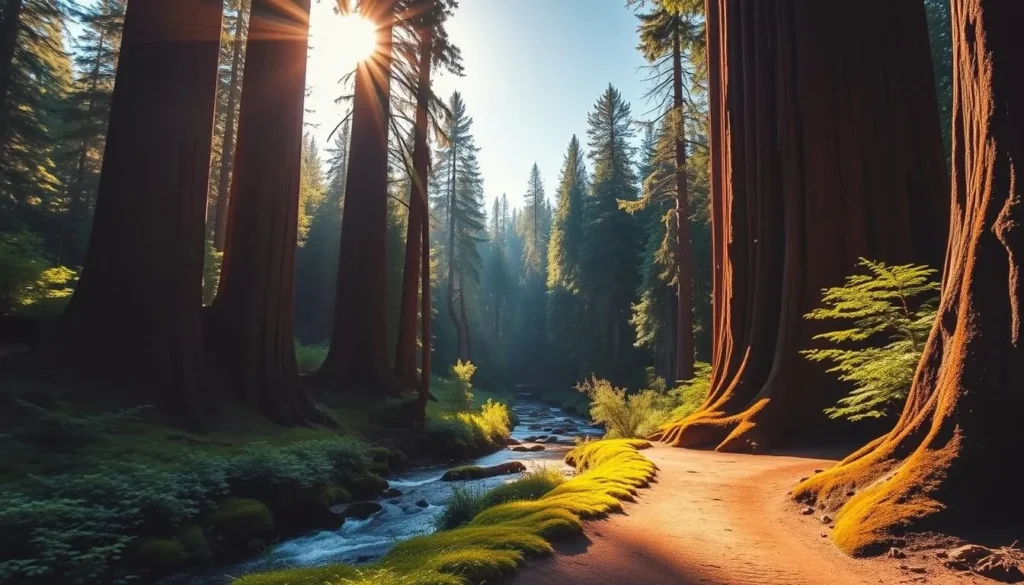
Exploring Jedediah Smith Redwoods State Park
As the northernmost park in the Redwood National and State Parks system, Jedediah Smith Redwoods State Park boasts some of the most pristine old-growth redwood forests. This park is a treasure trove of natural wonders, offering visitors a chance to immerse themselves in the majesty of the redwoods.
Boy Scout Tree Trail
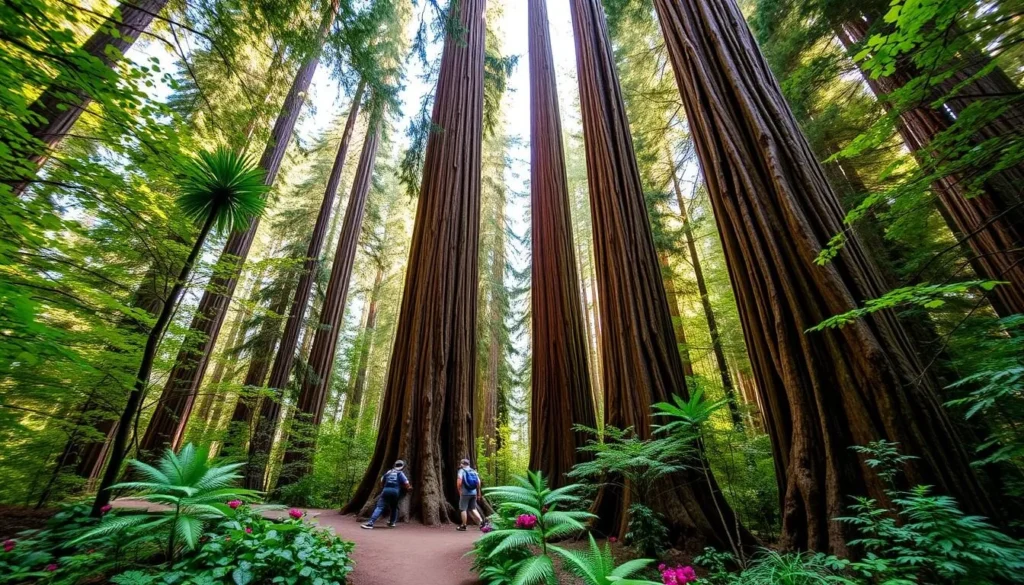
The Boy Scout Tree Trail is a 5.5-mile out-and-back hike that takes you through some of the most breathtaking old-growth redwoods in the park. The trail is known for its towering ancient redwoods, lush fern understory, and the impressive Boy Scout Tree, which is the culmination of the hike. As you walk, the serene atmosphere and the majesty of the trees will leave you in awe.
Stout Memorial Grove
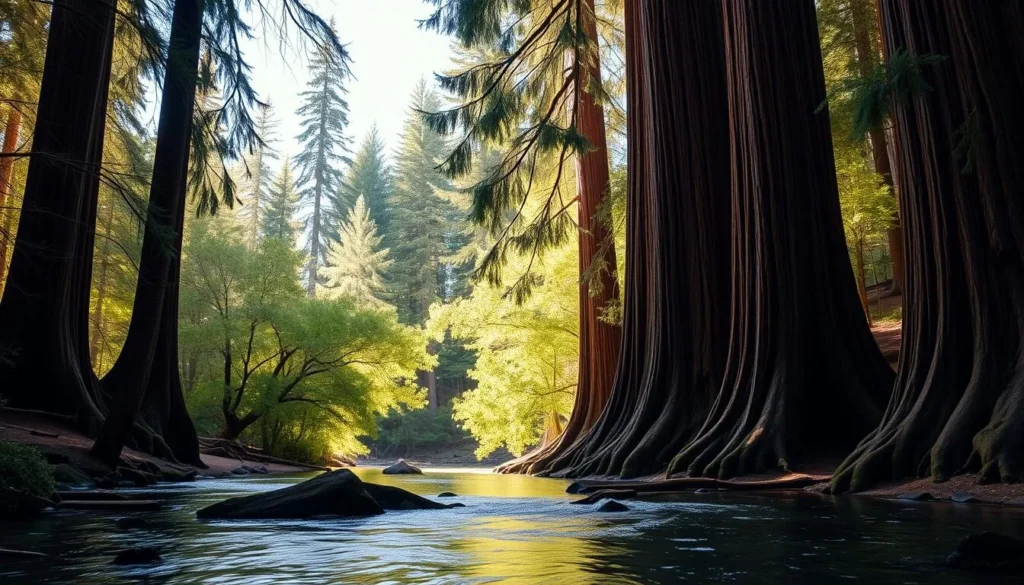
For those looking for a shorter and more accessible experience, Stout Memorial Grove offers a 0.6-mile loop trail that is perfect for families and visitors with limited time. The grove is a cathedral-like stand of massive redwoods along the Smith River, featuring a 340-foot-tall tree known as the Stout Tree. The tranquility of the grove, combined with the grandeur of the trees, makes for a deeply moving experience.
Driving Howland Hill Road
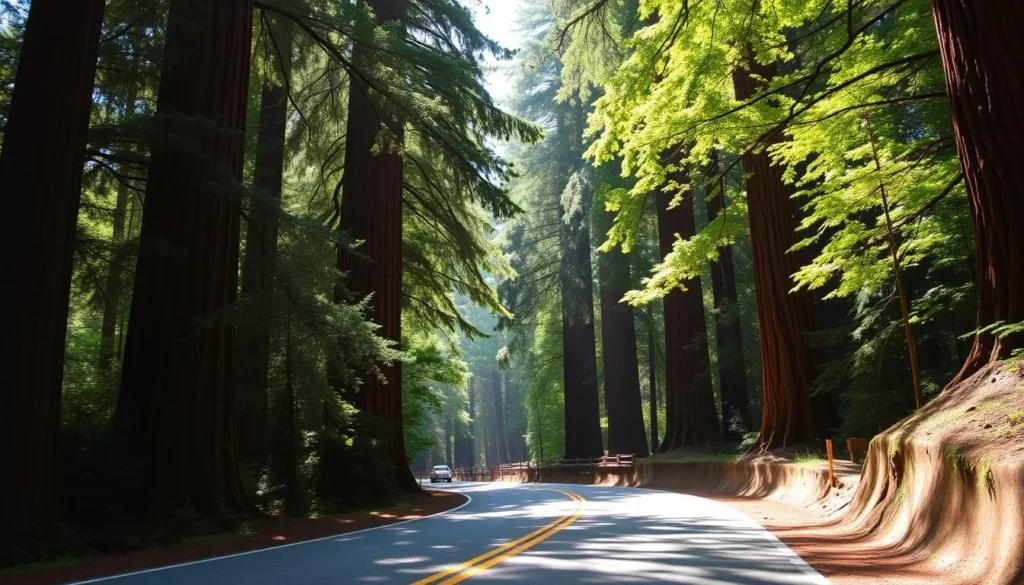
Driving Howland Hill Road is an experience in itself, offering one of the most scenic drives through old-growth redwoods in the entire park system. The road is unpaved and can be narrow and winding in parts, so caution is advised, especially for RVs and trailers, which are not recommended due to the risk of getting stuck. The scenic views and the opportunity to stop at various points along the way make the drive worthwhile.
Combining the Boy Scout Tree Trail, Stout Memorial Grove, and the drive along Howland Hill Road makes for a perfect day in Jedediah Smith Redwoods State Park. Each of these experiences offers a unique perspective on the natural beauty of the park, and together they provide a comprehensive and unforgettable visit.
Must-See Attractions in Prairie Creek Redwoods State Park
With its stunning old-growth redwoods, pristine streams, and diverse wildlife, Prairie Creek Redwoods State Park is a must-visit destination for nature lovers. This park is a highlight of the Redwood National Park system, offering a range of unforgettable experiences.
Fern Canyon Trail
The Fern Canyon Trail is a magical 50-foot-high canyon with walls draped in seven different species of ferns, made famous as a filming location for Jurassic Park. Visitors should be prepared to get their feet wet when exploring Fern Canyon, as the trail crosses the stream multiple times.
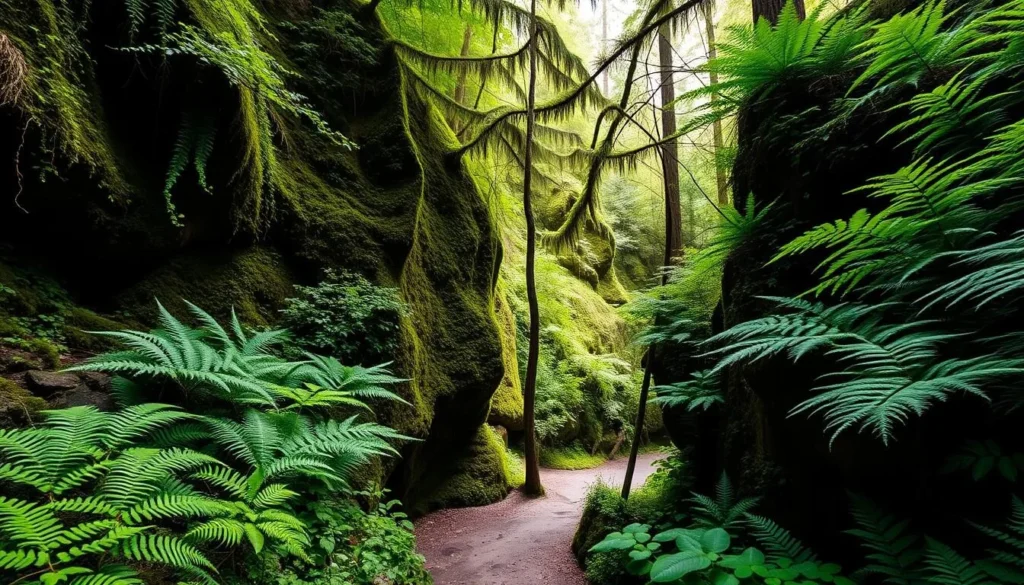
Roosevelt Elk Viewing
Prairie Creek and Golds Bluff are home to a herd of the largest subspecies of Elk in North America, the Roosevelt Elk. To spot these magnificent creatures, visit during early morning or late evening when they are most active.
Big Tree and Corkscrew Tree
The Big Tree is a roughly 1,500-year-old gigantic tree located only a short distance off Newton B. Drury Scenic Parkway within the Prairie Creek Redwoods. It stands 304 feet tall with a circumference of 68 feet, accessible via a short walk. The Corkscrew Tree is another unique attraction, where four trees have grown together in a spiral pattern, creating one of the park’s most photographed features.
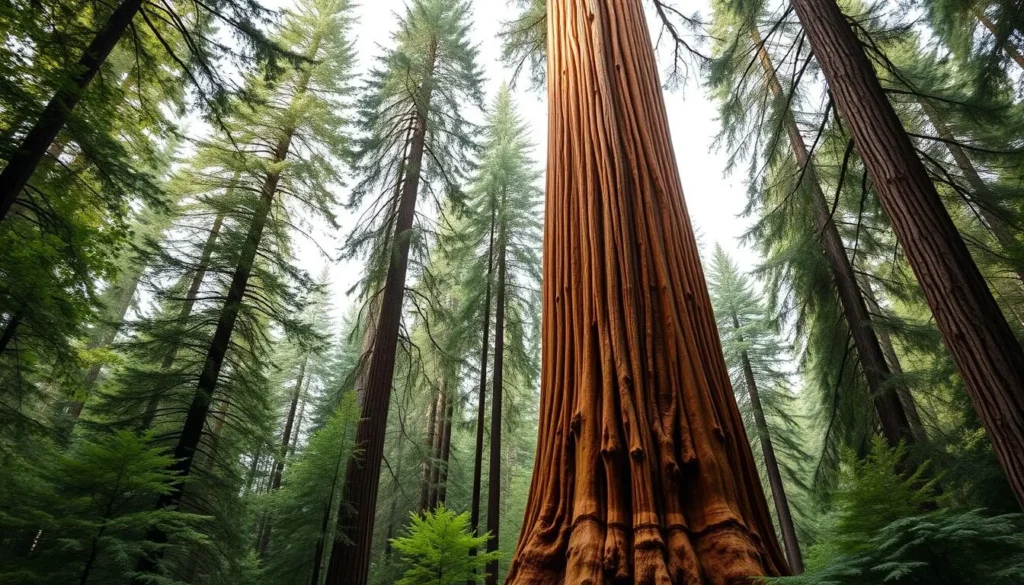
Combining these attractions with other Prairie Creek trails can make for a full day of exploration. Whether you’re hiking, wildlife viewing, or simply taking in the breathtaking scenery, Prairie Creek Redwoods State Park has something for everyone.
Highlights of Del Norte Coast Redwoods State Park
Where the ancient redwoods meet the Pacific Ocean, you’ll find Del Norte Coast Redwoods State Park. This unique park offers a blend of coastal scenery and redwood forests, making it a must-visit destination for nature lovers.
Coastal Trail and Enderts Beach
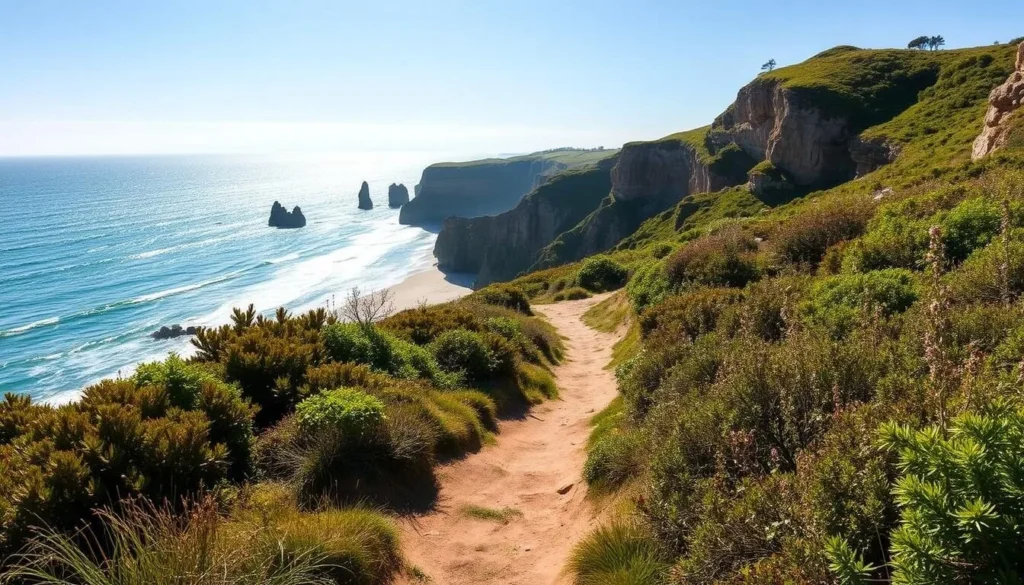
The Coastal Trail in Del Norte Coast Redwoods State Park offers dramatic views of the coastline and access to secluded beaches. A 1.2-mile round trip hike takes you down to Enderts Beach, a pristine and often-empty beach. Be prepared for steep sections along the trail.
Damnation Creek Trail
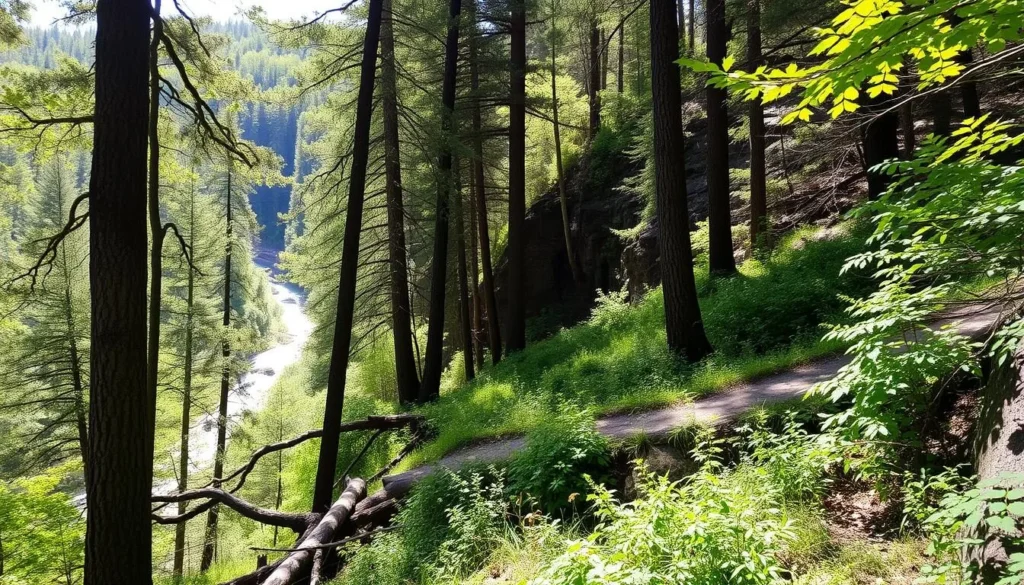
For a more challenging hike, the 4.2-mile Damnation Creek Trail descends 1,000 feet from the redwood forest to a secluded cove. This trail offers one of the most diverse hiking experiences in the park system, transitioning from ancient redwoods to coastal scrub. Hikers should be prepared for the strenuous return climb.
Both trails offer unique experiences and opportunities to enjoy the natural beauty of Del Norte Coast Redwoods State Park. The best times to hike these trails are early morning or late afternoon for optimal lighting and photography opportunities.
Redwood National Park, California: Best Things to Do for Families
Redwood National Park is a fantastic destination for families, offering a variety of activities that cater to children of all ages. The park’s diverse landscapes and wildlife provide a unique opportunity for kids to learn and explore.
Kid-Friendly Trails
The park features several kid-friendly trails that are perfect for families. The Stout Grove trail is a short and easy 0.6-mile loop that showcases old-growth redwoods, including the 340-foot-tall Stout Tree, and offers views of the Smith River. Another great option is the Lady Bird Johnson Grove, a 1.5-mile loop that takes you through a stunning redwood forest. For a more secluded experience, the Moorman Pond Trail is a 1.0-mile trail that’s often overlooked by visitors, making it an ideal choice for families seeking a quiet hike.
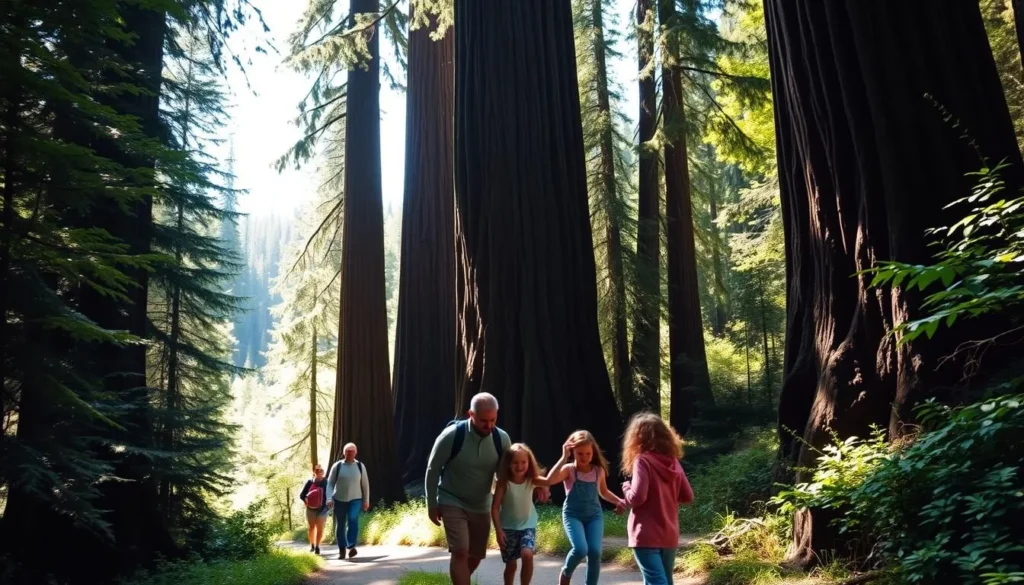
These trails are not only easy to navigate but also provide an immersive experience, with massive trees, nurse logs, and forest creatures that will captivate children’s imagination. To enhance their exploration, consider bringing along magnifying glasses, binoculars, and field guides.
Junior Ranger Program
The park offers a Junior Ranger program at its visitor centers, where children can complete activity booklets to earn badges and learn about forest ecology. This program is an excellent way to engage kids with the natural environment and teach them about the importance of conservation.
Additionally, for families visiting with dogs, the Bark!Ranger program allows pets to earn their own badges while learning about pet-friendly areas within the park. The Prairie Creek Visitor Center is particularly recommended, with its interactive exhibits and Roosevelt Elk viewing opportunities.
Scenic Drives Through the Redwoods
For those with limited time or mobility, scenic drives offer an accessible way to witness the grandeur of the redwoods. The Redwood National Park and its surrounding areas provide several scenic drives that allow you to immerse yourself in the tranquility of the redwood forests.
Avenue of the Giants
Avenue of the Giants is a 31.5-mile scenic byway through Humboldt Redwoods State Park that parallels Highway 101. It’s one of America’s most spectacular drives, offering a unique opportunity to see the California redwoods up close. This route is a must-visit for any nature enthusiast, with numerous pullouts and viewpoints along the way.
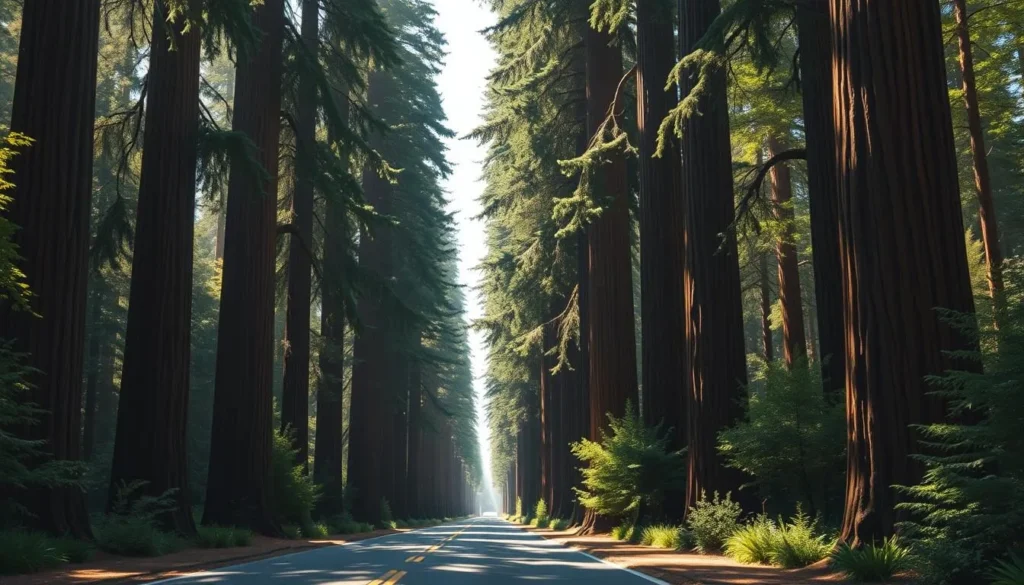
Newton B. Drury Scenic Parkway
Newton B. Drury Scenic Parkway is a 10-mile alternative to Highway 101 through Prairie Creek Redwoods State Park. This drive offers numerous pullouts for wildlife viewing and short walks, making it an ideal route for those who want to experience the beauty of the redwoods without exerting themselves too much.
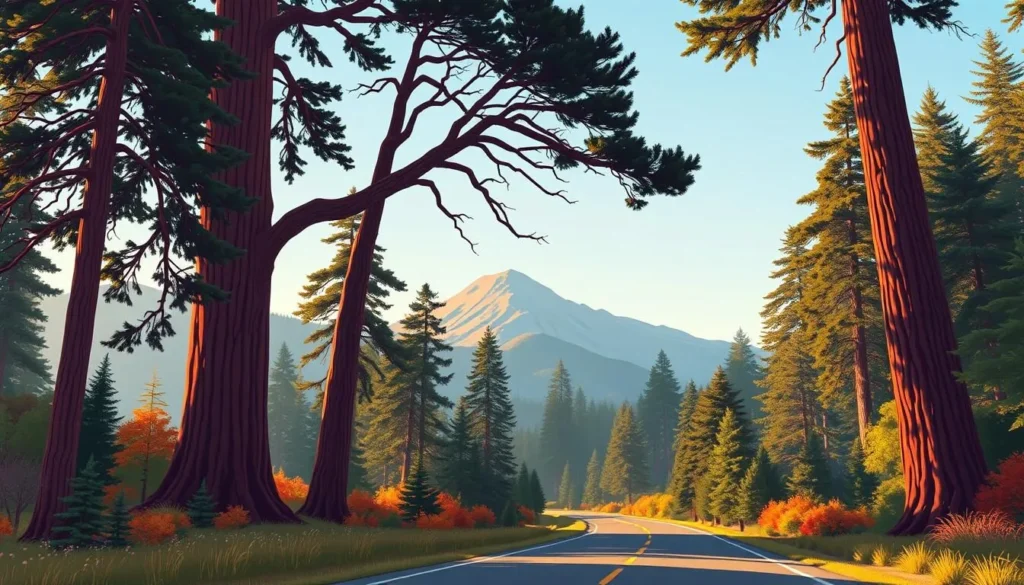
Bald Hills Road
Bald Hills Road is a less-traveled route that climbs from the redwood forest into open prairies with spectacular views and wildflowers in spring. While it’s not the best place to see the Redwoods compared to the state parks, it offers a unique perspective on the area’s diverse landscapes.
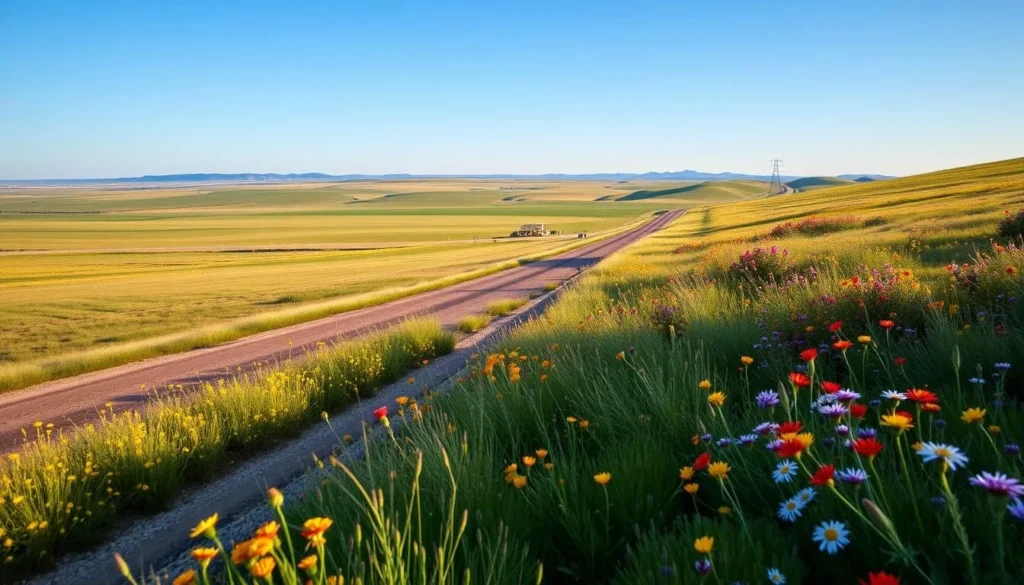
For the best experience, consider driving these scenic routes during the early morning or late afternoon when the light filters through the trees most dramatically. Be sure to stop at notable trees, short trails, and viewpoints along the way. Additionally, check road conditions and seasonal closures before you go to ensure a smooth drive.
Unique Redwood Experiences
If you’re looking for more than just a hike, the Redwood National and State Parks have a range of distinctive activities that will enhance your visit. These experiences offer different perspectives on the redwood forest, making your trip even more memorable.
Redwood Sky Walk
Located in Eureka, California, about an hour’s drive from Avenue of the Giants, is the Redwood Sky Walk. This canopy walk is suspended 100 feet above the forest floor, providing a bird’s eye view of the redwoods. It’s a unique way to experience the forest, though it can be a bit touristy, especially on weekends.
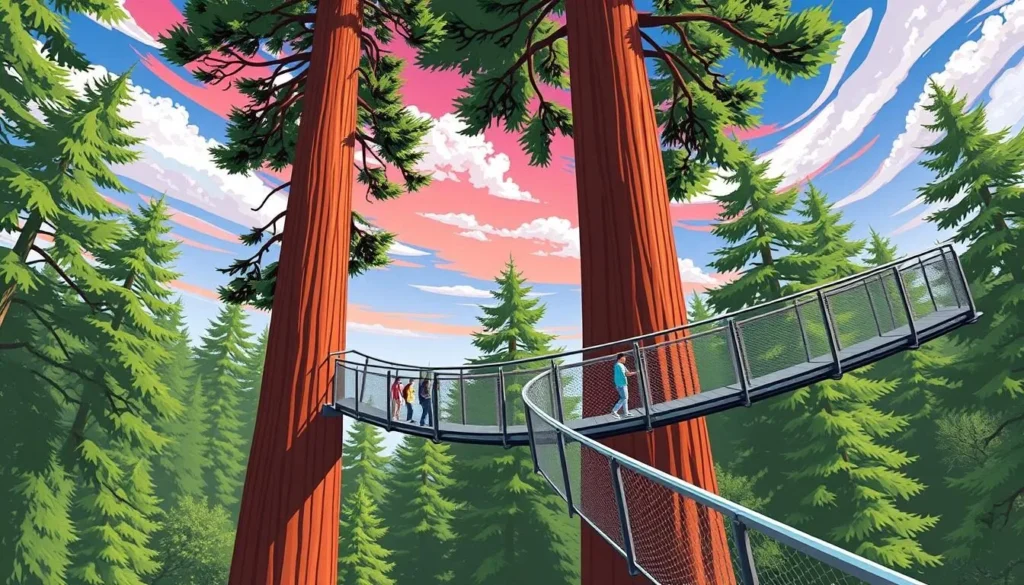
Drive-Thru Trees
The Redwood National Park area is home to three drive-thru trees, each located in different areas. The Shrine Tree is near Avenue of the Giants, the Chandelier Tree is in Leggett, CA, and the Klamath Tree is near the Prairie Creek Visitor Center. These trees are on private land and require a small fee to drive through.
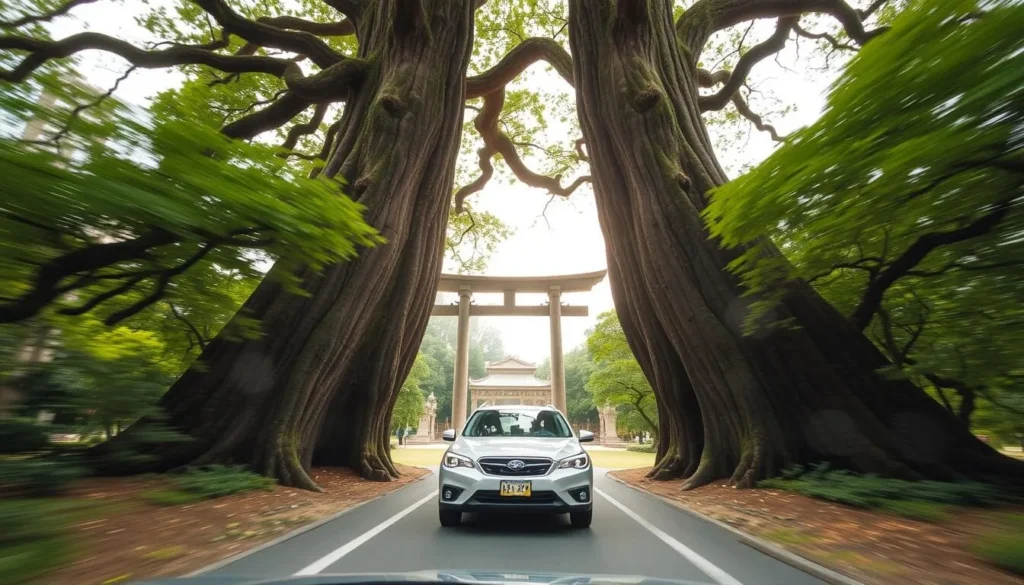
Beyond these attractions, the Redwood National and State Parks offer guided night walks, ranger-led programs, and special events throughout the year. You can also participate in photography workshops and forest bathing sessions, further enriching your experience in the redwoods.
These unique experiences complement the traditional hiking and driving tours, providing a well-rounded visit to the Redwood National Park and surrounding state parks. Whether you’re interested in exploring from new heights or driving through the trees, there’s something for everyone in this incredible area.
Best Coastal Viewpoints
Beyond the redwoods, the park’s 40 miles of pristine coastline offer breathtaking viewpoints. Redwood National Park is a treasure trove of natural beauty, with its coastline being a highlight of any visit.
Crescent Beach Overlook
Located just 3 miles south of Crescent City, Crescent Beach Overlook is one of the best cliffside overlooks in Redwood National Park. It offers unobstructed views of the Pacific coastline. You can drive right up to the wooden viewing deck, and if you’re looking for a hike, several nearby trails lead down to the beach.
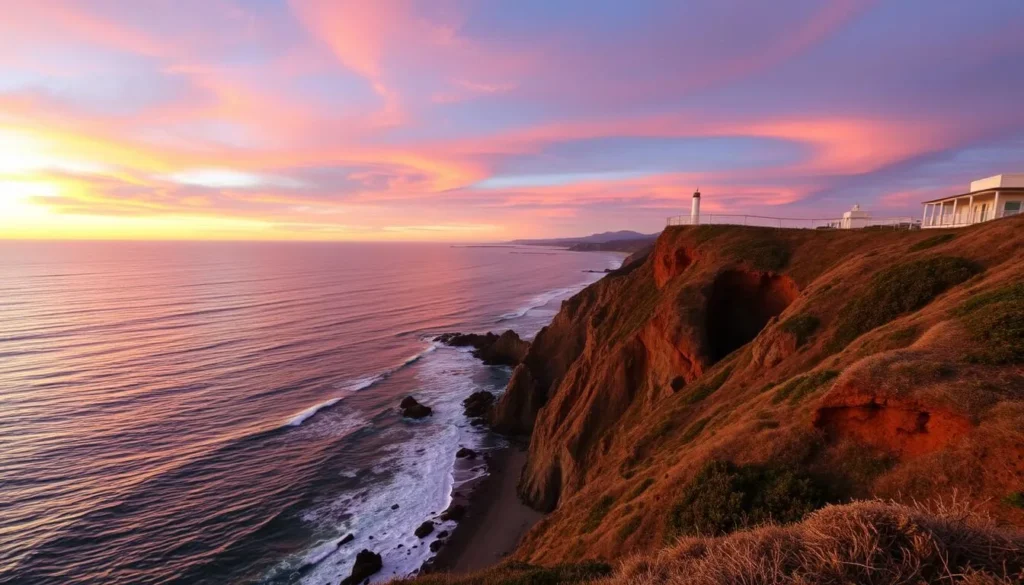
Klamath River Overlook
As you drive north to Del Norte, a stop at the Klamath River Overlook is a must for amazing ocean views. This viewpoint is particularly notable for witnessing the dramatic meeting of the river and ocean. During spring and fall, you can sometimes see whales migrating.
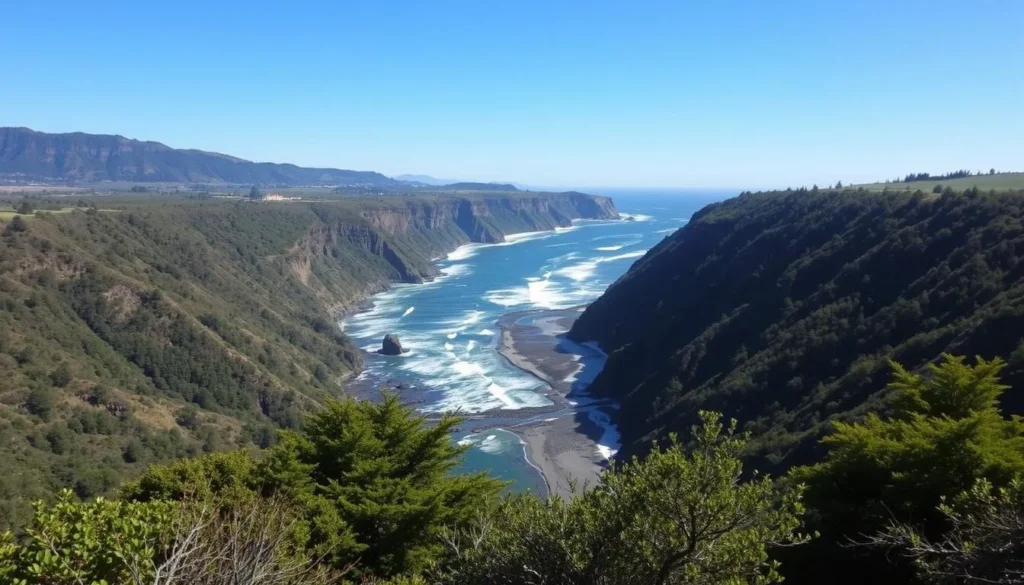
In addition to these overlooks, Redwood National Park features other spectacular coastal viewpoints, including High Bluff Overlook and Gold Bluffs Beach. The best times to visit these viewpoints are during the early morning or late afternoon, especially around sunset, when the light enhances the natural beauty of the scenery.
Combining these coastal viewpoints with nearby forest trails can make for a day that showcases the park’s diverse ecosystems. Wildlife viewing opportunities abound from these overlooks, with chances to see sea lions, harbor seals, and various seabirds.
Where to Stay When Visiting the Redwoods
The right accommodation can make all the difference when visiting Redwood National Park, so it’s essential to explore your options.
Lodging Options in Crescent City
Crescent City is the largest town near the northern section of Redwood National Park, offering a range of hotels, motels, and vacation rentals. While it’s tempting to book the cheapest option, beware that the lowest prices often come with lower quality accommodations. Instead, consider booking a reputable hotel or vacation rental that meets your needs.
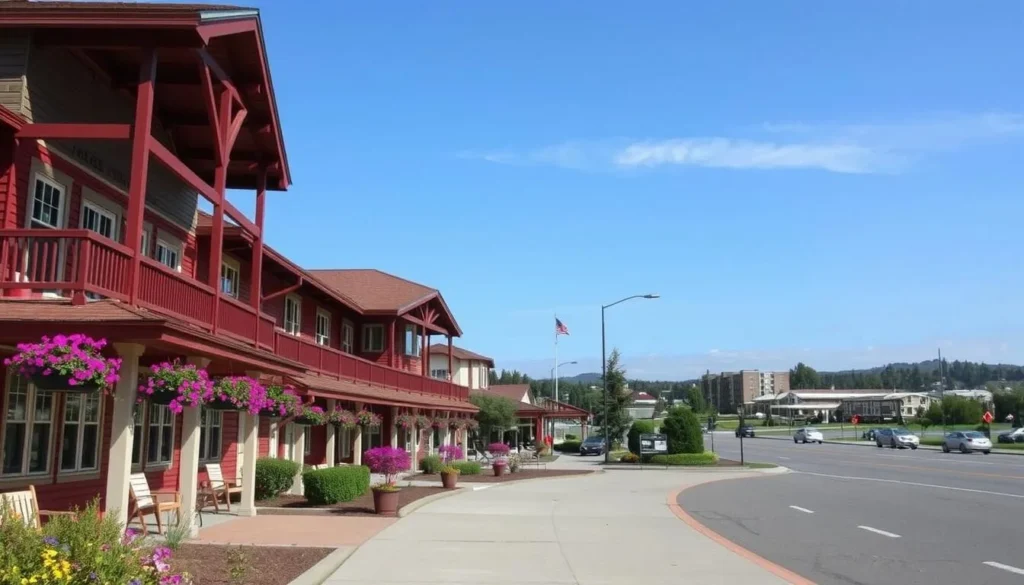
Camping in the Redwoods
For a more immersive experience, consider camping within Redwood National and State Parks. There are four developed campgrounds to choose from: Jedediah Smith, Mill Creek, Elk Prairie, and Gold Bluffs Beach. Each offers a unique experience, from camping among ancient redwoods to waking up to the sound of the ocean. Be sure to check the size restrictions and reservation requirements for each campground.
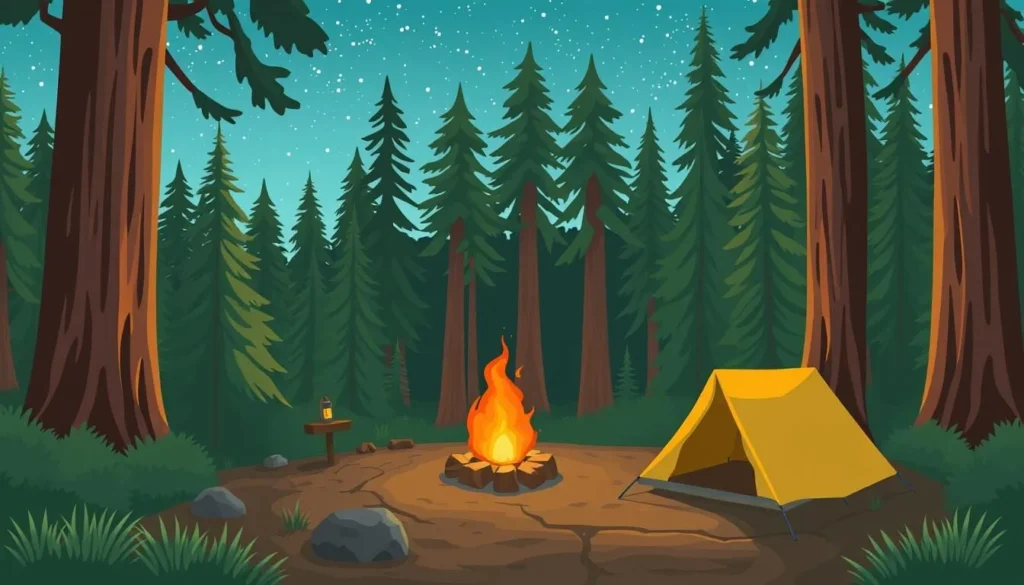
Nearby Towns and Accommodations
If you’re looking for alternative accommodation options, consider visiting nearby towns like Trinidad, Klamath, Orick, or Ferndale. Each town has its own charm and is located near different sections of the park. Be sure to book your accommodations well in advance, especially during peak season.
Image of a town near Redwood National Park
Advance reservations are crucial, especially during the summer months. We recommend booking your accommodations at least 6 months in advance to ensure availability.
Day Trip Ideas from Redwood National Park
Redwood National Park serves as an ideal base for exploring the natural beauty and charm of Northern California and Southern Oregon. The surrounding areas offer a variety of day trip options that are sure to enhance your visit.
Samuel H. Boardman Scenic Corridor
Just 40 minutes north of Crescent City, over the Oregon border, lies the Samuel H. Boardman Scenic Corridor, a rugged and dramatic stretch of coastline. This corridor is known for its stunning sea stacks, hidden coves, and breathtaking viewpoints.
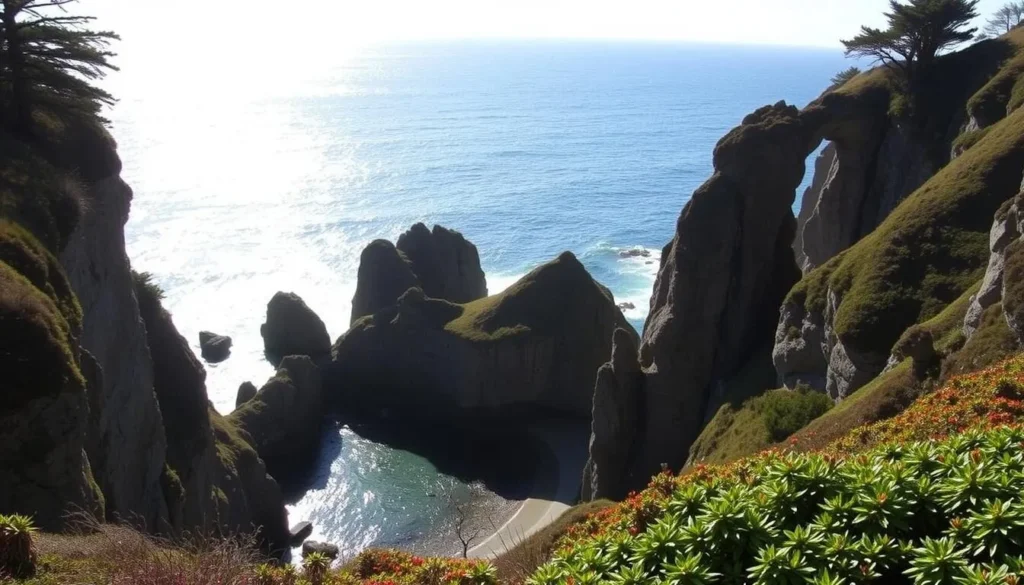
Some must-visit spots within the corridor include Natural Bridges, with its overlook offering spectacular views, and Secret Beach, accessible via a short hike. Arch Rock is another highlight, showcasing the natural beauty of the Oregon coast.
Lost Coast and Ferndale
For those with an extra day, a trip to the Lost Coast, south of Redwood National Park, is highly recommended. This remote and undeveloped coastline is accessible via a scenic drive along a narrow, winding road. Shelter Cove is a notable stop, offering stunning coastal views.
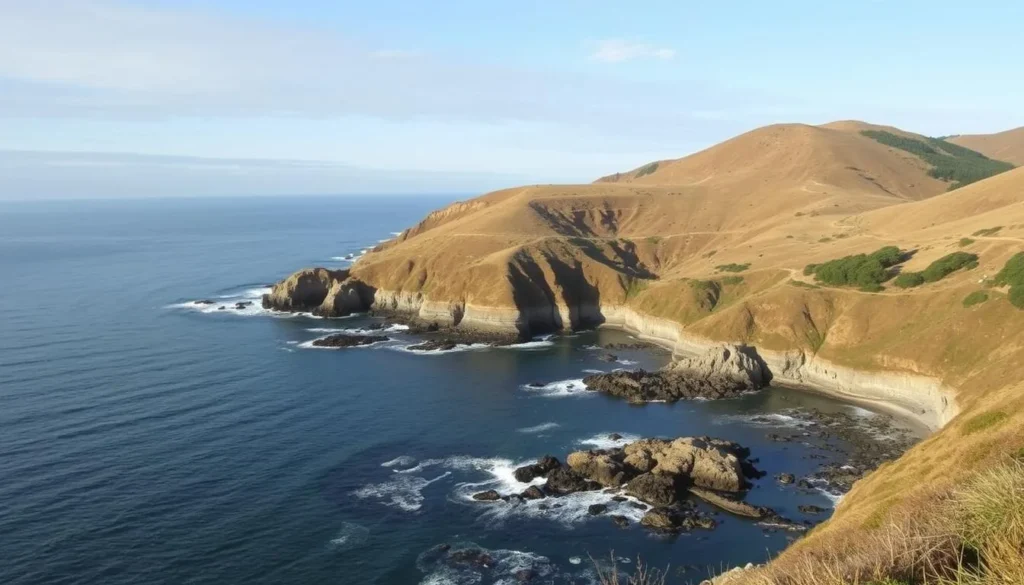
Another charming day trip destination is Ferndale, a Victorian village with well-preserved architecture and unique shops. Walking through downtown Ferndale feels like stepping back in time, with its quaint atmosphere and historic buildings.
When planning your day trips, consider the driving times and road conditions to make the most of your visit. Combining these trips with your park visits based on your accommodation location can help minimize driving time and maximize your experiences.
Conclusion
Redwood National Park, with its diverse landscapes and rich biodiversity, is a must-visit destination for any nature enthusiast. As you’ve discovered through this guide, the park offers an incredible diversity of experiences, from exploring ancient forests to enjoying pristine coastlines.
Whether you’re looking for easy scenic drives, family-friendly short hikes, or challenging backcountry adventures, Redwood National and State Parks have something for everyone. To make the most of your visit, it’s essential to plan ahead due to the park’s size and the distance between attractions. A minimum stay of 2-3 days is recommended to experience the highlights, though a week would allow for a more comprehensive exploration.
As you enjoy these magnificent forests, remember to follow Leave No Trace principles to protect these ancient ecosystems. Standing among trees that have lived for over a thousand years is a transformative experience that brings a new perspective on the world. We invite you to share your own Redwood experiences and favorite spots in the comments section below.
In conclusion, Redwood National Park is a place where the majesty of nature is on full display. We hope this guide has inspired you to visit and experience it for yourself. With its unique blend of natural beauty and outdoor activities, it’s a destination that will leave you with unforgettable memories.
The above is subject to change.
Check back often to TRAVEL.COM for the latest travel tips and deals.
